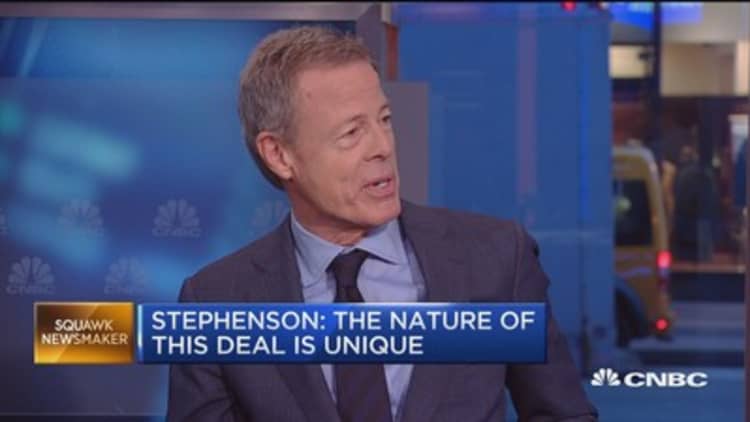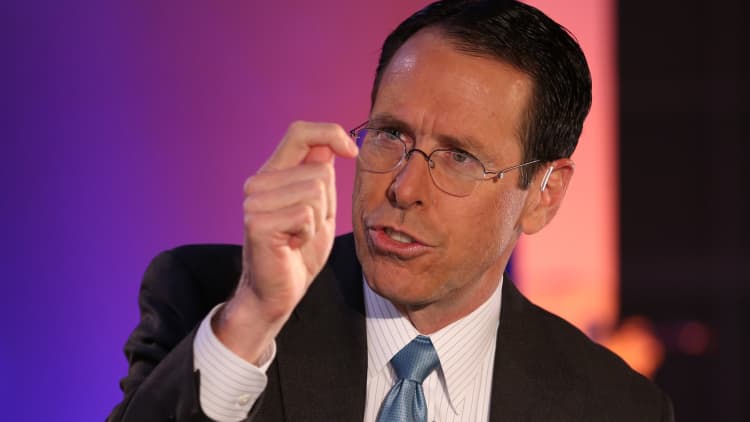
"You had a lot of people saying you should've combined a donkey with a rabbit and gotten a flying unicorn."
That was how Jeffrey Bewkes, the chief executive of Time Warner, once described his company's colossal failure of a merger with AOL. He spent the last decade dismantling much of his company in the name of "focus," spinning off his cable business and magazine empire.
And yet over the weekend Mr. Bewkes agreed to sell Time Warner to AT&T for $85 billion in a deal that, if approved by regulators, will vastly reshape the media and telecommunications world — and ultimately the way Americans will consume and pay for their favorite television shows.
There was a good reason that Mr. Bewkes had been skeptical of big mergers that combined distribution and content: They are complex and hard to make successful, and they invariably face enormous headwinds from regulators, who will undoubtedly tie their hands in an effort to protect consumers from anti-competitive behavior.
"Let's be honest, prices aren't going to go down because of this," said Rich Greenfield, a media analyst at BTIG Research. "I don't think vertical integration lends itself to consumer benefits."
Already, Donald J. Trump has denounced the acquisition and said, "We'll look at breaking this deal up" if he were president. Tim Kaine, Hillary Clinton's vice-presidential nominee, said he was concerned about the transaction. "Less concentration, I think, is generally helpful, especially in the media," he said on "Meet the Press."
A raft of consumer-protection groups are already girding for a fight. And media and telecommunication rivals are hinting that they are prepared to battle the deal in Washington. "A transaction of this magnitude obviously warrants very close regulatory scrutiny," a spokesman for Disney said.
The worry among consumer groups and rivals, of course, is that for AT&T to make the deal work strategically and financially — the company is paying a 35 percent premium to Time Warner's stock price before news of the deal broke last week — it is going to use Time Warner's content as a weapon against its rivals by raising the price that they pay for carriage of channels such as HBO and CNN, while integrating those same channels into new AT&T offerings at lower prices.
Randall Stephenson, AT&T's chief executive, dismissed that notion in an interview on Sunday, calling it "illogical" and saying he wants to "dispel" such an idea. He insisted he has no intention to limit Time Warner's content on rival systems and that "it doesn't make business sense" to restrict the distribution of Time Warner programming.
Instead, he said, he sees the benefits of the merger coming from the additional data AT&T will be able to provide to Time Warner — and advertisers — about what consumers are watching, as well the ability to create specialized, interactive programming for AT&T's mobile customers that he expects other distributors will copy.
Still, he suggested that his ultimate goal is to create a wireless network using next-generation technology known as 5G that competes not just with wireless providers, but with cable companies, by providing high-speed broadband and television service. "I will be sorely disappointed if we are not going head-to-head" with cable providers by 2021, he said.
That notion may be both attractive and unattractive to regulators. On one hand, AT&T would be able to finally create real competition for cable companies, which have long held monopoly or duopoly positions in most markets. Owning Time Warner, Mr. Stephenson said, would "drive our incentive" to build out its next- generation network even faster.
On the other hand, regulators have been reticent to let cable companies merge to create a truly national footprint out of fear that it would put too much power into the hands of distributors; the government blocked Comcast's acquisition of Time Warner Cable, for example.

But Craig Moffett, another veteran media research analyst, said he gave the deal only a 50-50 chance of being approved.
"You can imagine lots of strategies that would involve withholding content from distributors or not counting downloads of Time Warner content against data caps," Mr. Moffett said. "But those things are either already expressly prohibited or will be" as part of any arrangement AT&T and Time Warner make with regulators.
It is a question that Mr. Greenfield raised too. "If you're not going to be able to withhold HBO from Verizon, what exactly are you getting?" he asked.
Which raises the question: Why pursue the deal at all?
Well, there are some potential benefits. While AT&T probably won't be able to use Time Warner's current crop of channels to bludgeon its competitors, it will be able to use Time Warner's creative team to devise all sorts of new programming options, many of which could become exclusive to AT&T.
What's to stop AT&T, for instance, from creating a better version of Verizon's Go90, a specialized original channel. Go90 hasn't caught on, but AT&T could leverage Time Warner's team to create the next-generation HBO — and that channel could likely be exclusive to AT&T's service.
Still, upstart companies like Netflix and Amazon Prime have proven that it is possible to create great original content without owning a legacy media company. Hire a couple of great creative executives and wave around a big checkbook, and you can attract high-quality scripts and headline-grabbing stars.
In the chess game that is the media industry — a tens-of-billions-of-dollars version of "Game of Thrones" — perhaps owning Time Warner will give AT&T a jump-start into a world that many couldn't even imagine a decade ago. "It's empire building," Mr. Greenfield said.
Whether it proves to be a success or the "flying unicorn" that AOL merger turned out to be remains the question.
So as they say in the television business: Stay tuned.
(Disclosure: Comcast is parent of NBCUniversal and CNBC.)


